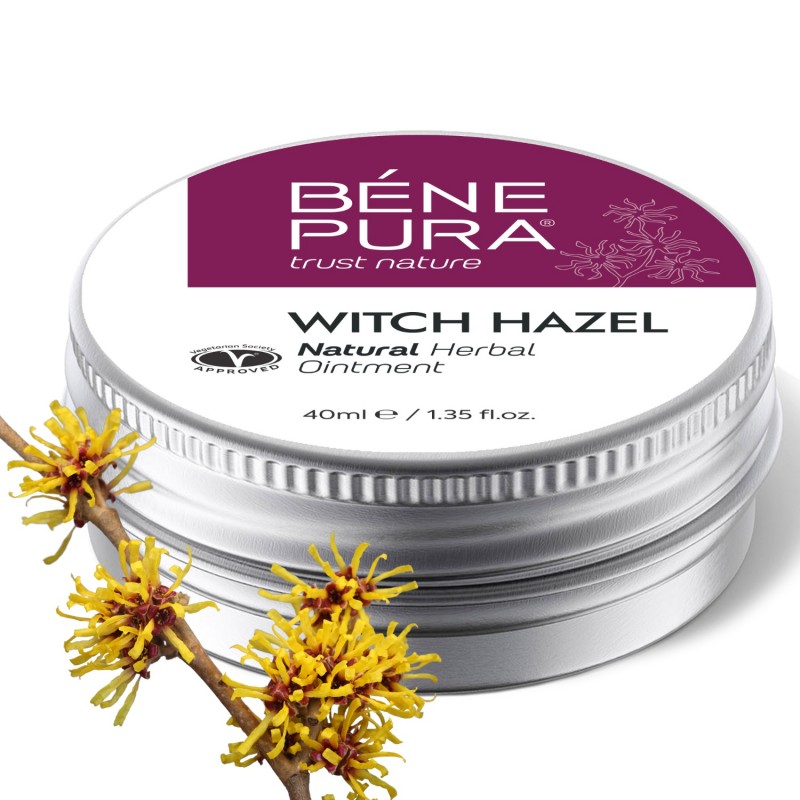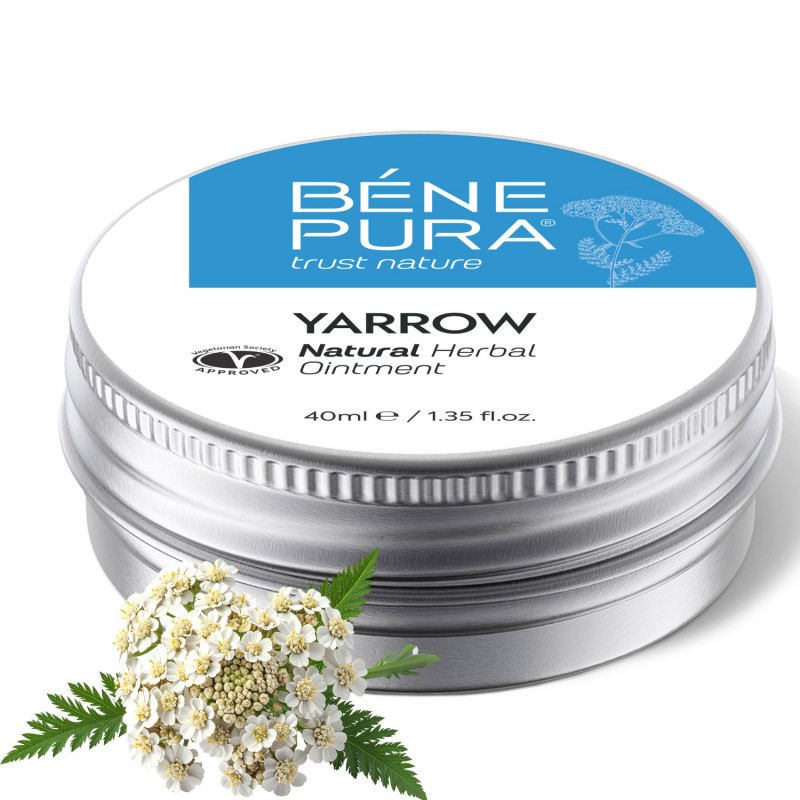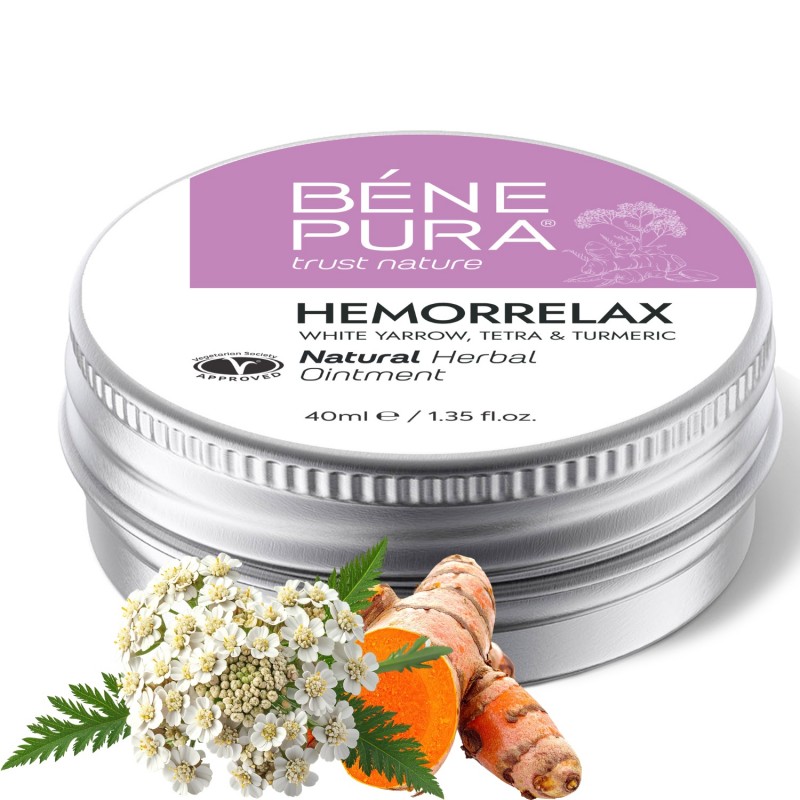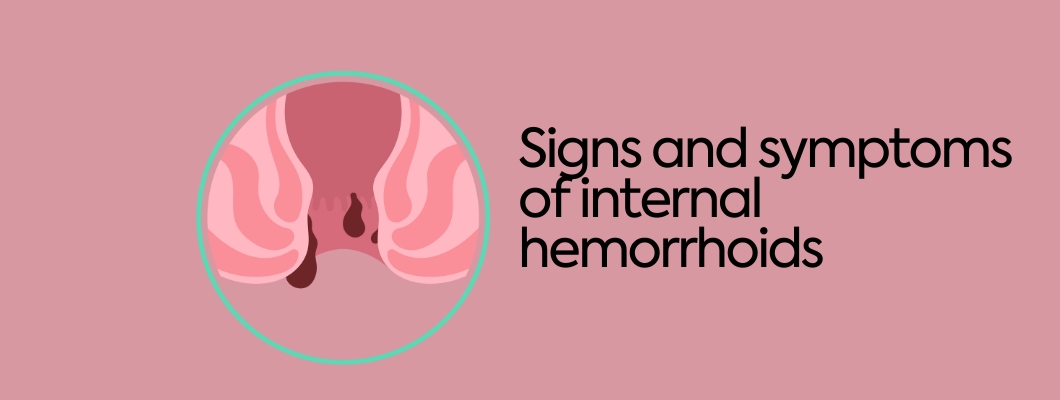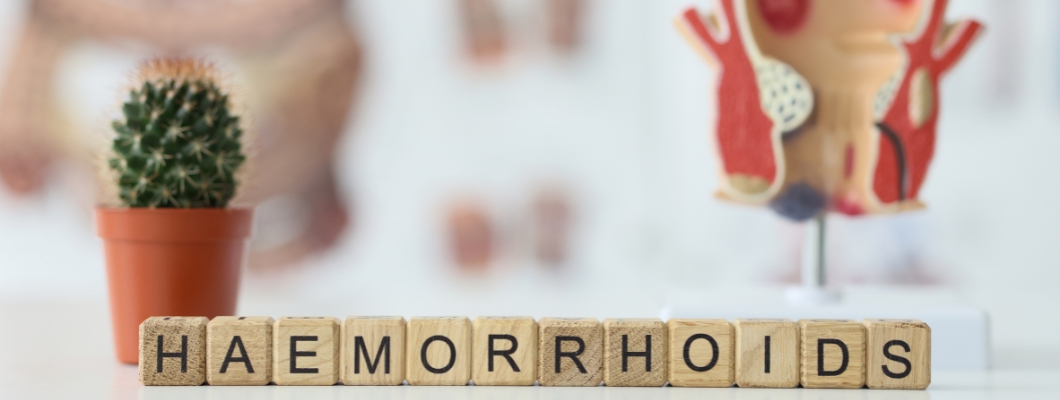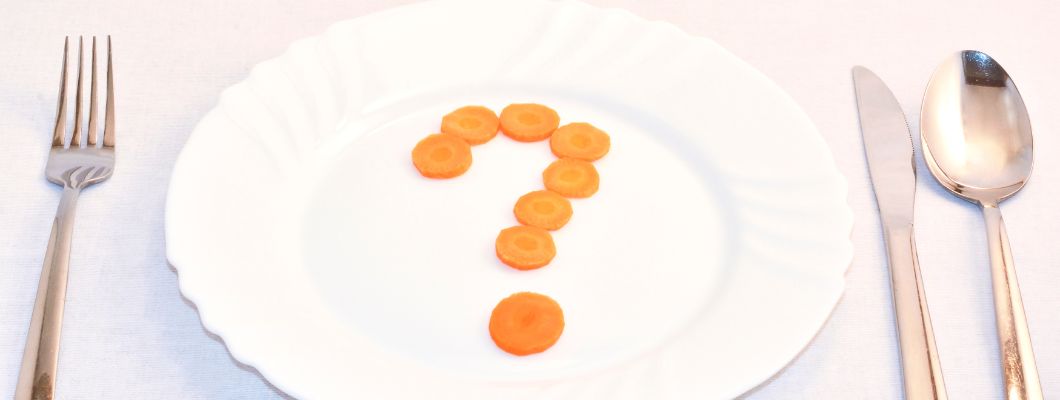White Yarrow for Hemorrhoids - An Effective Natural Solution
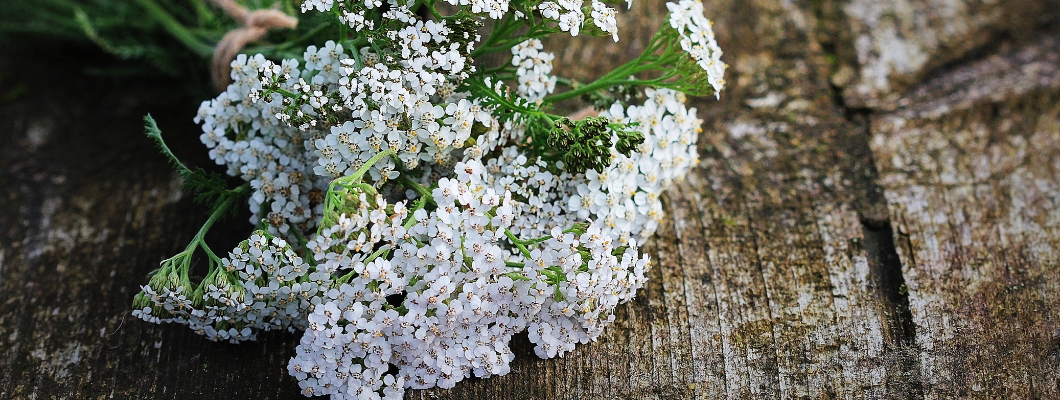
Yarrow is a well-known medicinal plant that has been used for centuries for various health problems. One of these problems is hemorrhoids.
Table of Contents
In this article, we will look at how yarrow can help with hemorrhoids and why it is so effective.
1. What is White Yarrow?
Yarrow ( Achillea millefolium ) is a perennial herb that belongs to the Asteraceae family. It is known for its healing properties and is used in the traditional medicine of various cultures around the world. White yarrow grows wild in meadows, roadsides and open spaces, preferring sunny or semi-shaded locations and well-drained soils.
The plant reaches a height of 20 to 90 cm and has pinnately cut leaves that are silver-green in color and give the plant its characteristic appearance. The flowers of White Yarrow are small, white or pink and are collected in dense inflorescences called umbels. They bloom in summer and autumn, usually from June to September.
Chemical composition
Yarrow contains numerous bioactive compounds that contribute to its healing properties. Among them stand out:
- Flavonoids: these compounds have powerful antioxidant and anti-inflammatory properties;
- Tannins: they help shrink tissues and reduce inflammation;
- Essential oils: contain ingredients such as camphor and eucalyptol , which have antiseptic and anti-inflammatory properties;
- Achilleine: an alkaloid that helps blood clot.
How was Yarrow used in the past?
Yarrow has been used in medicine since ancient times. According to legend, the ancient Greek hero Achilles used the plant to treat the wounds of his soldiers during the Trojan War, hence its Latin name Achillea. In traditional Chinese medicine, yarrow is used to stimulate blood circulation and relieve pain.
Modern use
In modern herbal medicine, yarrow is used to treat a wide range of ailments, including digestive disorders, menstrual problems and skin conditions. Preparations from the plant are applied both internally and externally, in the form of teas, tinctures, compresses and creams.
2. White Yarrow for Hemorrhoids: How does it Help?
Anti-inflammatory properties
The anti-inflammatory properties of White Yarrow are due to the flavonoids and tannins contained in the plant. These compounds reduce tissue inflammation and relieve the pain and discomfort associated with hemorrhoids. Flavonoids, such as luteolin and apigenin, have antioxidant properties that protect cells from damage and help repair inflamed tissues.
Hemostatic properties
Yarrow is known for its hemostatic properties, meaning it can stop bleeding. This is especially helpful for bleeding hemorrhoids where bleeding can be problematic. Achillein, one of the active compounds in Yarrow, stimulates blood clotting and helps stop bleeding quickly.
Vasoconstrictive properties
The vasoconstrictor properties of Yarrow help shrink varicose veins in the rectal area, which reduces swelling and relieves pain. This action is due to essential oils and tannins, which reduce the permeability of capillaries and strengthen the walls of blood vessels. This contributes to faster recovery and reduction of hemorrhoid symptoms.
Antiseptic properties
The essential oils in Yarrow, such as camphor and eucalyptol, have antiseptic properties that help prevent infection in the affected area. This is important because hemorrhoids can be subject to bacterial infections that complicate the condition.
Calming effect
Yarrow has a soothing effect on the skin and mucous membranes, which helps relieve itching and irritation associated with hemorrhoids. Compresses and ointments containing Yarrow extract can provide instant relief and comfort.
3. How to Use White Yarrow for Hemorrhoids?
Using yarrow to treat hemorrhoids can be effective in several different ways. These methods include both internal and external use, and each offers its own specific benefits.
Yarrow Tea
Making yarrow tea is one of the easiest and most commonly used methods to treat hemorrhoids. This tea has anti-inflammatory and antiseptic properties that can help reduce symptoms.
How to make yarrow tea:
- Take 1-2 teaspoons of dry yarrow;
- Steam them in a glass of hot water for 10-15 minutes;
- Strain the tea and drink it two or three times a day.
Drinking this tea regularly can help reduce inflammation and relieve pain.
Compresses with Yarrow
Yarrow compresses are an effective way to directly treat External hemorrhoids. They help reduce swelling, itching and irritation.
How to make a yarrow compress:
- Prepare a Yarrow decoction by boiling 1-2 tablespoons of dry flowers in a liter of water for 10 minutes;
- Allow the decoction to cool to a comfortable temperature;
- Dip a clean gauze or cloth in the solution and apply it to the affected area for 10-15 minutes;
- Repeat the procedure two to three times a day.
Ointments and creams with White Yarrow
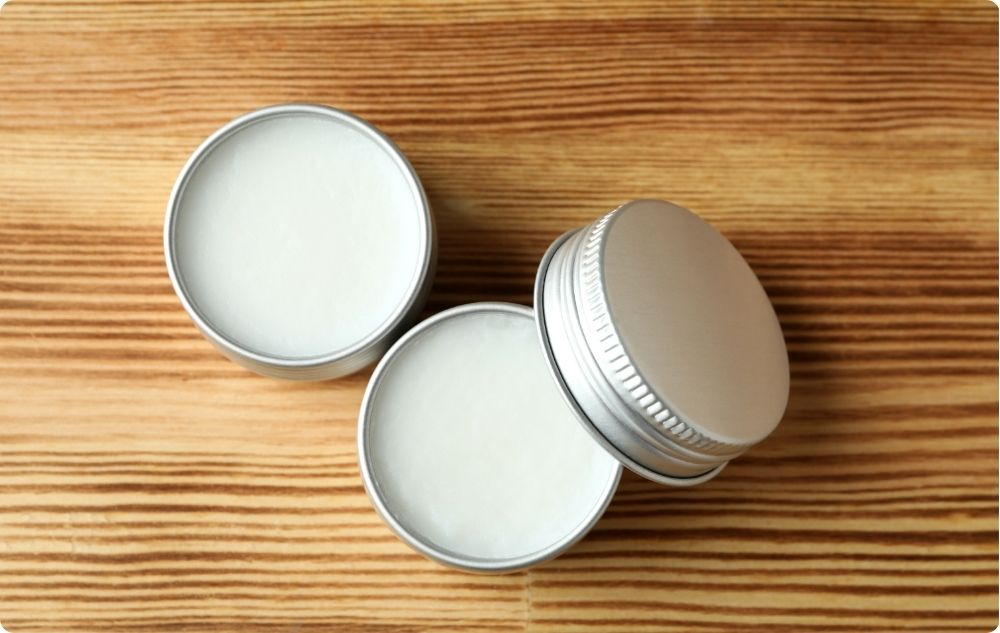
Ointments and creams containing Yarrow extract are available in pharmacies and online stores and can be used to relieve the symptoms of hemorrhoids. They combine the antiseptic and anti-inflammatory properties of the plant with other beneficial ingredients.
How to use Yarrow ointments and creams:
- Clean the affected area thoroughly with warm water and mild soap;
- Apply a small amount of ointment or cream to the hemorrhoids;
- Repeat application according to the manufacturer's instructions, usually two to three times a day.
These products can help reduce inflammation, relieve pain, and prevent infection.
Internal use of Yarrow tincture
Tinctures are concentrated plant extracts and can be particularly effective for internal use. Yarrow tincture can be taken orally to treat Internal hemorrhoids.
How to take yarrow tincture:
- Dissolve 20-30 drops of tincture in a small amount of water;
- Take this dose two to three times a day.
This form of use helps to internally reduce inflammation and improve circulation.
4. Useful tips to Prevent Hemorrhoids
Prevention of hemorrhoids involves lifestyle and dietary changes that reduce the risk of developing this unpleasant condition.
Here are some of the most effective methods:
Increase your fiber intake
Fiber plays a key role in maintaining healthy digestion and preventing constipation, which is a major cause of hemorrhoids. A diet rich in fiber can significantly reduce the risk of developing hemorrhoids.
Foods rich in fiber:
- Fruits such as apples, bananas, and strawberries;
- Vegetables such as broccoli, carrots, and spinach;
- Whole grains such as oatmeal, brown rice, and whole grain bread;
- Legumes such as beans, lentils, and peas.
Regular consumption of these foods helps in the formation of soft and bulky stools, which facilitates bowel movements and reduces the pressure on the rectal veins.
Drink enough water
Dehydration can lead to constipation and hard stools, which increases the risk of hemorrhoids. Drinking enough water is essential for maintaining hydration and proper digestive system function.
Recommendations for water intake:
- Drink at least 8 glasses of water a day (about 2 liters);
- Increase water intake during physical activity or in hot weather;
- Consume water-rich foods such as cucumbers, watermelon, and tomatoes.
Avoid prolonged sitting
Prolonged sitting, especially in the same position, can increase the pressure on the veins in the rectal area. Taking regular breaks and exercise is important to prevent hemorrhoids.
Recommendations for avoiding prolonged sitting:
- Take short breaks every hour if you work sitting down;
- Walk or stretch for a few minutes;
- Use ergonomic chairs that support proper posture.
Maintain a healthy weight
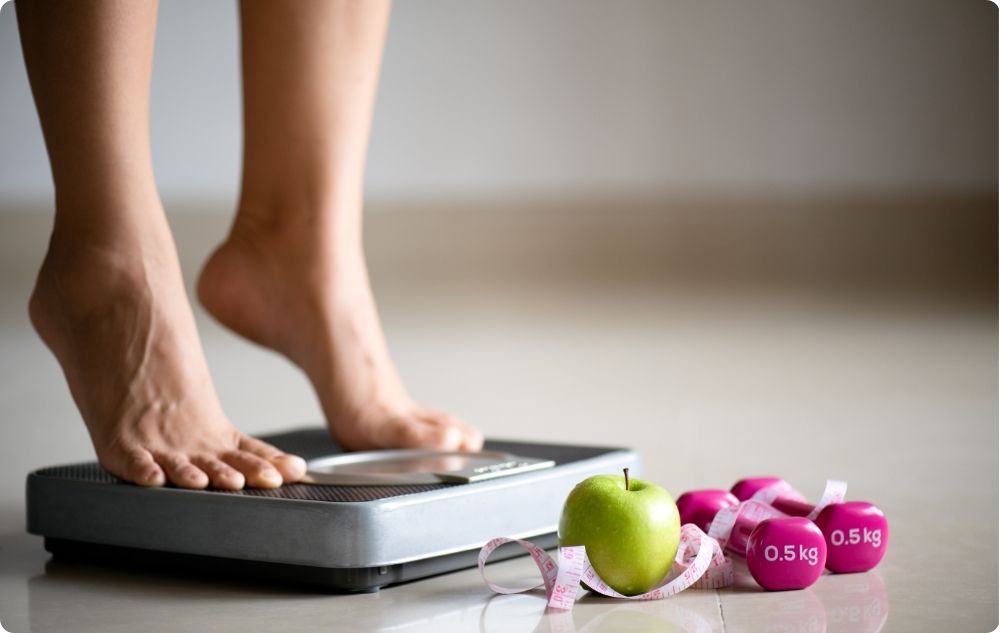
Excess weight can increase the pressure on the veins in the pelvic area, which contributes to the development of hemorrhoids. Maintaining a healthy weight through a balanced diet and regular physical activity is essential.
Recommendations for maintaining a healthy weight:
- Eat a balanced diet rich in fruits, vegetables, and whole grains;
- Engage in regular physical activity, at least 30 minutes a day;
- Avoid processed foods and excessive intake of sugars and fats.
Do not strain when having a bowel movement
Straining during bowel movements is a major cause of hemorrhoids. Using proper techniques and preventing constipation can reduce this risk.
Recommendations for proper bowel movements:
- Do not strain or hold your breath during bowel movements;
- Use a footstool to elevate your legs and make it easier to have a bowel movement;
- Visit the toilet as soon as you feel the need to avoid stool retention.
5. Conclusion
Yarrow is a powerful natural remedy that can significantly relieve the symptoms of hemorrhoids thanks to its anti-inflammatory, hemostatic and vasoconstrictive properties. The use of yarrow teas, compresses, salves and tinctures provides a variety of ways to treat and relieve the discomfort associated with this condition.
Along with lifestyle and dietary changes, including increasing fiber intake, staying hydrated, avoiding prolonged sitting, and maintaining a healthy weight, these measures can help prevent and effectively manage hemorrhoids.
It is always advisable to consult a medical professional before starting a new treatment to ensure safety and effectiveness.
SOURCES:
1. Herbsey: Yarrow for Hemorrhoids (27.05.2024)

